ARTICLE AD BOX
Sameer Hashmi
Business reporter
Reporting fromJeddah

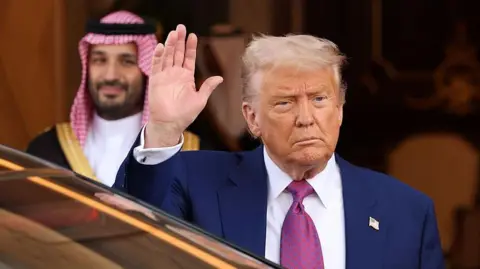 Getty Images
Getty Images
Trump started the four-day visit in Saudi Arabia where deals worth $600bn were announced
Flying home from his Gulf trip last week, President Donald Trump told reporters "that was a great four days, historic four days".
Visiting Saudi Arabia, Qatar and the United Arab Emirates (UAE), he added in this trademark swagger that "the jobs and money coming into our countries, there has never been anything like it".
Trump claimed that he was able to secure deals totalling more than $2tn (£1.5tn) for the US, but do the numbers add up?
The trip itself was an extravaganza, with the three Gulf states pulling out all the stops.
Escorts of fighter jets, extravagant welcoming ceremonies, a thundering 21-gun salute, a fleet of Tesla Cybertrucks, royal camels, Arabian horses, and sword dancers were all part of the pageantry.
The UAE also awarded Mr Trump the country's highest civilian honour, the Order of Zayed.
The visit's optics were striking; the region's richest petrostates flaunted their opulence, revealing just how much of that fortune they were ready to deploy to strengthen ties with the US while advancing their own economic goals.
Before embarking on the trip, President Trump, who touts himself as a "dealmaker in chief" was clear that the main objective of the trip was to land investments worth billions of dollars. On the face of it, he succeeded.
In Saudi Arabia, Crown Prince Mohammed bin Salman reiterated a pledge to invest $600bn in US-Saudi partnerships. There were a plethora of deals announced as part of this, encompassing arms, artificial intelligence (AI), healthcare, infrastructure projects and science collaborations, and various security ties and initiatives.
The $142bn defence deal grabbed a lot of the attention as it was described by the White House as the largest arms deal ever.
However, there remains some doubt as to whether those investment figures are realistic.
During his first term in office from 2017 to 2021, Trump had announced that Saudi Arabia had agreed to $450bn in deals with the US.
But actual trade and investment flows amounted to less than $300bn between 2017 to 2020, according to data compiled by the Arab Gulf States Institute.
The report was authored by Tim Callen, the former International Monetary Fund (IMF) mission chief to Saudi Arabia, and now a visiting fellow at the Arab Gulf States Institute.
"The proof with all of these [new] deals will be in the pudding," says Mr Callen.
The BBC contacted the White House for comment.

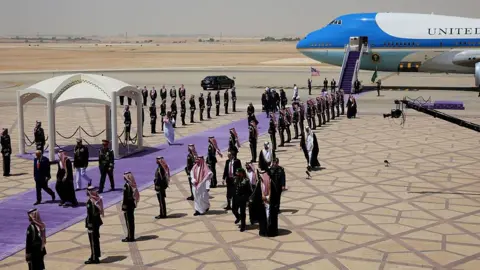 Getty Images
Getty Images
President Trump was given a welcome fit for royalty
In Qatar, Trump announced an "economic exchange" worth at least $1.2tn. However, in the fact sheet released by the White House deals worth only $243.5bn between the two countries were mentioned.
One of the Qatari agreements that was confirmed was Qatar Airways purchasing up to 210 passenger jets for $96bn from the beleaguered American aircraft manufacturer.
The White House said the deal would support 154,000 jobs in the US each year of their production, totalling one million jobs over the deal's lifecycle.
Meanwhile, the UAE inked an agreement to construct the world's largest AI campus outside the US, reportedly granting it access to 500,000 cutting edge microchips from US giant Nvidia, starting next year.
This project sits within the UAE's broader pledge to invest $1.4tn in the US over the next decade.
As well as the challenge of delivering what is promised, another potential obstacle to these figures being realised are oil prices.
Oil prices tumbled to a four-year low in April amid growing concerns that Trump's tariffs could dampen global economic growth. The decline was further fuelled by the group of oil producing nations, Opec+, announcing plans to increase output.
For Saudi Arabia, the fall in global oil prices since the start of the year has further strained its finances, increasing pressure to either raise debt or cut spending to sustain its development goals.
Last month, the IMF cut the forecast for the world's largest oil exporter's GDP growth in 2025 to 3% from its previous estimate of 3.3%.
"It's going to be very hard for Saudi to come up with that sort of money [the $600bn announced] in the current oil price environment," Mr Callen adds.
Other analysts note that a lot of the agreements signed during the trip were non-binding memorandums of understanding, which are less formal than contracts, and do not always translate into actual transactions. And some of the deals included in the agreement were announced earlier.
Saudi oil firm Aramco, for instance, announced 34 agreements with US companies valued at up to $90bn. However, most were non-binding memorandums of understanding without specified monetary commitments.
And its agreement to purchase 1.2 million tonnes of liquified natural gas annually for 20 years from US firm NextDecade was also included in the list of new deals, despite it first being announced months ago.

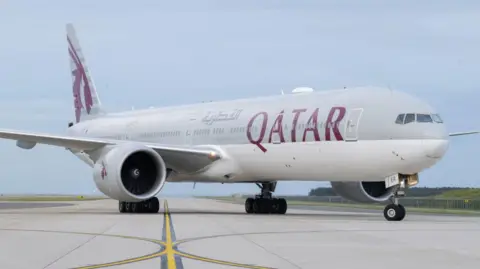 Getty Images
Getty Images
One of the deals announced on the trip was Qatar Airways buying 210 new aircraft from Boeing
Yet the massive investments mark a continuation of the shift in the US-Gulf relationship away from oil-for-security to stronger economic partnerships rooted in bilateral investments.
Bader Al Saif, an assistant professor at Kuwait University and an associate fellow at think tank Chatham House, says that the deals indicate that US and the Gulf states are "planning the future together and that was a significant change for the relationship".
He adds that the AI deals with the UAE and Saudi Arabia were central to this as "they clearly demonstrate that they are trying to see how to build the new global order and the new way of doing things together".
This emphasis on AI underscores the growing strategic importance of the technology to US diplomacy. Trump was accompanied on the trip by Sam Altman, the boss of OpenAI, Nvidia's Jensen Huang, and Elon Musk, who owns Grok AI.
And on the eve of the visit, the White House scrapped tough Biden-era restrictions on exports of the advanced US semiconductors required to best run AI systems. The rules had divided the world into tiers, with some countries enjoying broad access to its high-end chips, and others being denied them altogether.
About 120 countries, including the Gulf nations, were grouped in the middle, facing strict caps on the number of semiconductors they could import. This had frustrated countries such as Saudi Arabia, who have ambitions to become high-tech economies as they transition away from oil.
Both Saudi and the UAE are racing to build large-scale AI data centres, while Abu Dhabi, the UAE's capital, aims to become a global AI hub.
The UAE has made visible efforts to reassure Washington – deepening partnerships with US tech firms, curbing ties with Chinese companies, and aligning more closely with American national security interests.
Mr Al-Saif says that the UAE is "betting on the Americans when it comes to AI". "We have seen that the technological turn in the 90s came from the US anyway."

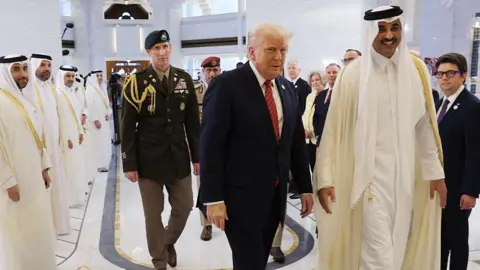 Getty Images
Getty Images
After Saudi Arabia Trump travelled to Qatar where $1.2tn of deals were announced
Both camps are hailing the visit as a triumph. For the Gulf, and especially Saudi Arabia, it resets a partnership that frayed under Biden, and underscores their ambition to act as heavyweight players on the world stage.
For Trump, touting "trillions" in new investment offers a timely boost - his tariff hikes have dented global trade and pushed US output into its first quarterly dip in three years.
These Gulf deals will be sold as proof that his economic playbook is working.
At the end of the trip, Mr Trump worried that whoever succeeds him in the White House would claim credit for the deals once they come to completion.
"I'll be sitting home, who the hell knows where I'll be, and I'll say, 'I did that,'" he said.
"Somebody's going to be taking the credit for this. You remember, press," he said, pointing to himself, "this guy did it."
Read more global business stories

 8 hours ago
3
8 hours ago
3
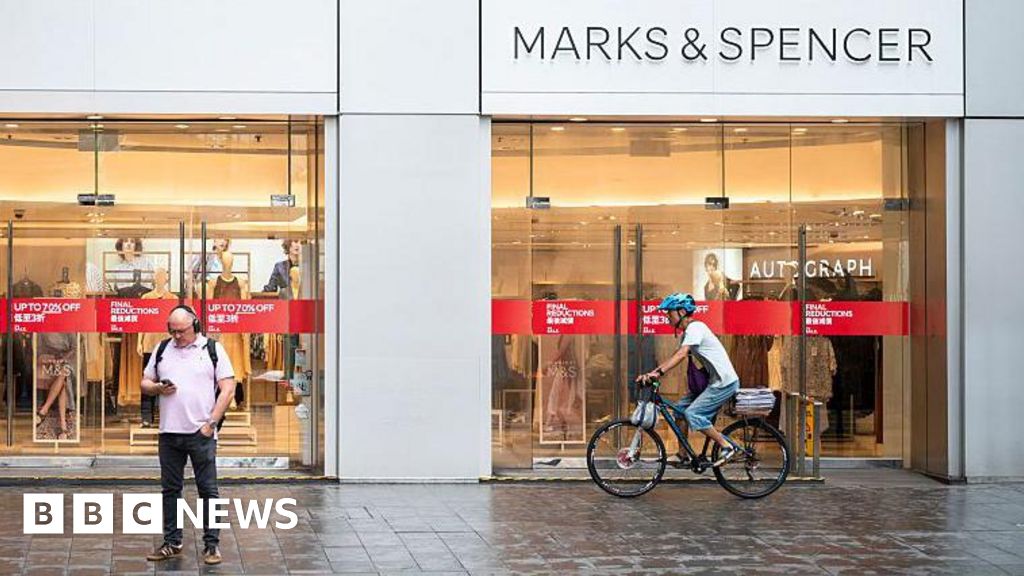

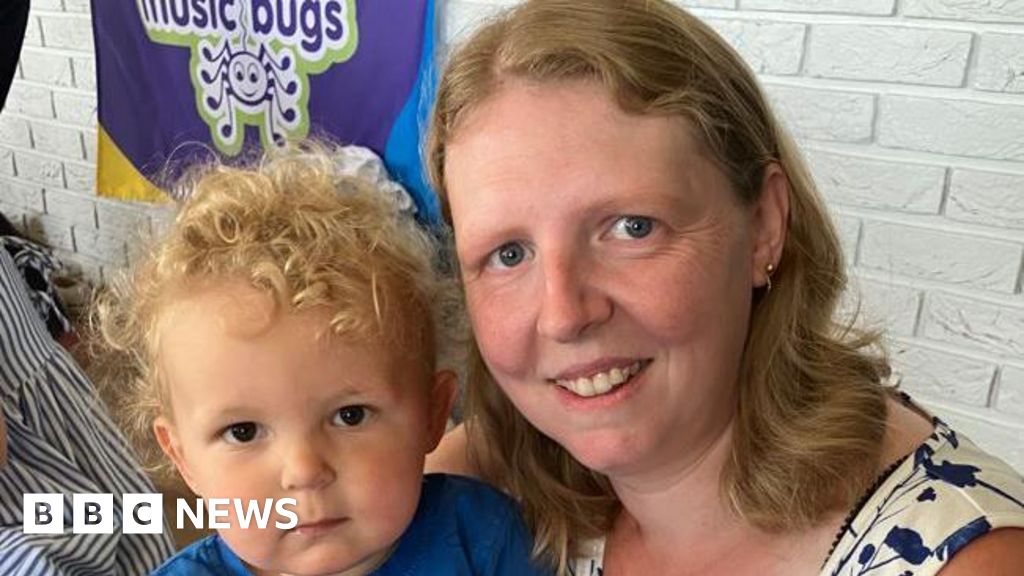





 English (US) ·
English (US) ·